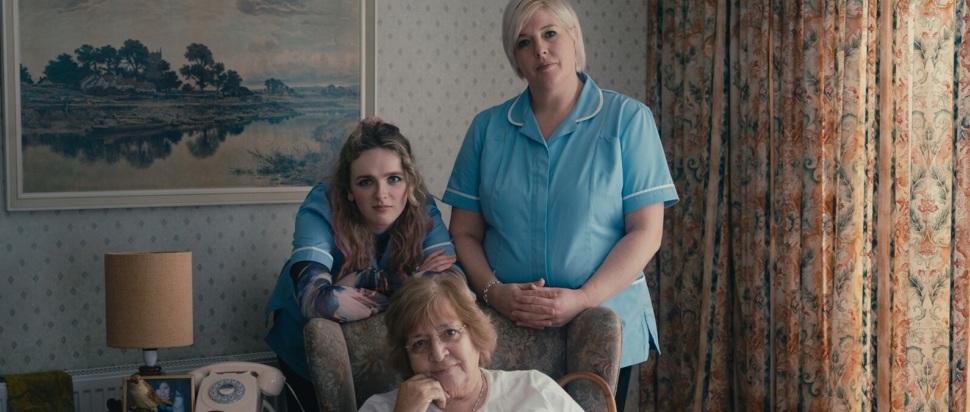Scotland on Screen: Jagoda Tłok on short film Care
Care isn't just last year's best Scottish student film, it's probably the best short film made in Scotland that year, period. Edinburgh-based Polish director Jagoda Tłok tells us how its story was inspired by her spell working in Scotland's care system
Every year, the Scottish film scene produces at least one breakout short, and in 2024 that film is Care. The crackerjack graduate project directed by Edinburgh Napier's Jagoda Tłok has been a mainstay on the festival circuit since its debut at last year’s Edinburgh Film Festival, and it has been hoovering up awards. This month it’s one of four contenders vying for the Best Short at the Scottish BAFTAs.
“Oh, it's crazy,” Tłok tells me. “Like, we really, really, really didn't expect any of this.” It seems that underestimating herself is something of a habit for Tłok. She explains that she’d been interested in a career in film since secondary school but ended up taking a circuitous path: “I knew I wanted to study film, but I wasn't very confident. I definitely never thought I could write and direct.”
Tłok's first taste of filmmaking was making shorts with school friends in her hometown in Poland, but back then she was in front of the camera. “I wanted to be an actress first,” she recalls. “I think that's all I felt I could do, you know?” But she quickly found she was more useful behind the scenes. “Well, we didn't know what we were doing,” she laughs, “but I guess I started taking care of the logistics and organising stuff.” Essentially, she was acting as a producer, and these early dalliances with film inspired her to apply for a production course at a Polish film school.... but she didn't get accepted.
Then came Scotland. Tłok moved to Edinburgh hoping to study film here, but the path still wasn’t straightforward. “I had no idea what the system was, how to write a personal statement, any of that.” When a place at film school still alluded her, she found a course in Interactive Media Design at Edinburgh College through the UCAS Clearing system. “It was the closest course to film I could find,” she explains. “I thought, ‘I'm not going to waste time. I'm just going to get into the system.’” After a disastrous spell studying television (“I don't hate TV as an idea, but the course wasn't for me”), Tłok finally got into Screen Academy at Napier at 25.
A bit more experience in the real world might help explain why Care is such a triumph. The film centres on Hania (Aleksandra Blaszczyk), a young Polish immigrant who’s working as cover staff for a private care company. We follow her during a gruelling shift working alongside Lorna (Deborah Anderson), an older Scottish woman who’s been ground down by the job. The atmosphere between the pair is spiky at first, but they soon find a sense of solidarity as their company’s app keeps rushing them to their next job, not allowing them to provide the level of care their vulnerable clients need.
The film was inspired by Tłok’s own experience of working as a carer during the pandemic when the restaurant she worked in closed. She calls the experience “horrific” – "I think the film is quite mild; it was very difficult" – but realised she could channel it into something positive. “I always knew that I had to say something about this system, because it is awful, and the best way I could do that, obviously, was through film. But it took a while. It was two years before I could reflect on it with any perspective.”
Tłok credits much of Care’s success to its producer, Jess Kelly, whom she met on the Napier course. “Nothing would have happened without her,” Tłok says of Kelly. “She is the one who brought the team together and made sure that the team is as big as it needed to be.” Kelly had some hands-on experience in the Scottish film industry (she worked on Irvine Welsh's series Crime and the prehistoric Highland-set horror Out of Darkness) and had an ambition for Care's student crew to operate as close to a professional one as possible; they even had an intimacy coordinator. “Having that big a team was great for me because that meant I didn't have to do anything except actually direct. You don't often have that when you're making student films – certainly not the student films I'd made before. Usually you have to wear a lot of different hats.”
There are many reasons why Care has been so warmly embraced on its festival run. It’s centred on two naturalistic and nuanced performances; despite dealing with bleak subject matter, it’s flecked with humour and humanity; in its 13-minute runtime, it explores more ideas – issues around immigration, the inhumanity of capitalism, the power of worker solidarity – than most features. But perhaps why it’s so struck a chord is that it’s a clear-eyed look at a profession that’s rarely been depicted on screen.
“Everyone knows someone who either works in care or has someone in their family who's in care,” says Tłok. “So many people have come to us asking for the link to send to their sister or auntie who works in care. A lot of people seem very touched by how realistic it is. It makes me really happy that there are people out there who are in the system who feel seen because of the film. I'm really, really proud about that.”
Care is nominated for Best Short at this year's BAFTA Scotland Awards, taking place 17 Nov
Filmography: Code of Conduct (2024), Care (2023), Her Picture: Choir Song (2023, music video), You Will Never Walk Alone (2021)
w: jagodatlok.com
